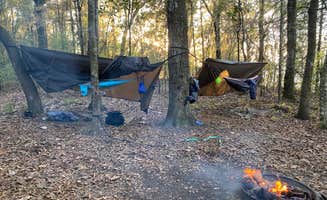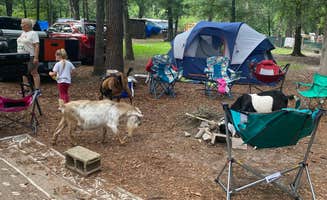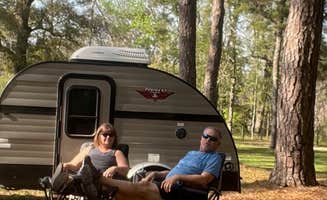Tent camping near Wacissa, Florida offers access to multiple water systems including the Wacissa River, Lake Talquin, and natural springs with year-round temperatures of 72 degrees. The region features sandy soil with limestone outcroppings typical of north Florida's karst topography. Most campsites require moderate preparation for weather that ranges from humid 90°F summer days to occasional winter freezes.
What to do
Paddling tours: The Suwannee River Wilderness Trail connects several river camps spaced approximately 10-12 miles apart, making multi-day paddling trips convenient. At Dowling Park River Camp, one camper noted, "We did a 65 mile paddle on the Suwanee River and stayed at two river camps and a campsite! These river camps are a TREAT!"
Spring swimming: Natural limestone springs provide unique swimming opportunities with crystal-clear water. A visitor to Lafayette Blue Springs State Park Campground described, "Beautiful spring for swimming featuring a limestone bridge way you can snorkel under. If you're into diving they also have an underwater cave, just make sure to check in with the ranger station 2 miles north before diving."
Wildlife viewing: The region's waterways support diverse wildlife including alligators, wading birds, and aquatic species. Camp sites often provide direct observation opportunities, though maintaining safe distances remains important. As one camper reported about the area, "You do not want to fall in - we were told lots of gators hand along the shore."
What campers like
Budget-friendly options: Most primitive campsites in the area offer affordable rates. Whitehead Landing NF Campground charges just "$3/night" according to one camper who added, "you can't beat the peace and quiet! These campsites include a metal fire ring and picnic tables. There is also a pit toilet that is surprisingly clean, trash receptacles, and water spigots."
Screened sleeping platforms: Several river camps feature elevated, screened structures that provide protection from insects while maintaining airflow. A camper at Dowling Park described them as "screened in pavilions with light/fan and outlets. Each one has a fire pit, grill and water spigot!"
Uncrowded camping: Even during peak seasons, many camping areas remain relatively quiet. At Camp Mack, one visitor reported, "Pulled in around 3:00 on a Saturday afternoon. Only 3 other sites were being used. Felt very safe. $10 a night. With the America The Beautiful lifetime pass, we paid $8.50."
What you should know
Non-potable water access: While many sites provide water spigots, the water typically requires treatment before drinking. At Whitehead Landing, "There is non-potable water spigot" available for campers, according to a recent visitor.
Seasonal conditions: Hunt camps may become busy during hunting seasons but offer quiet alternatives other times. A visitor to Pope Still Hunt Camp described their experience: "The last 2 miles of the entry road is unpaved. There are 2 areas next to each other for dispersed camping. About 10-15 campers total when we were there."
Flood potential: River sites can become difficult to access during high water periods. At Dowling Park, facilities are designed for flooding: "Dowling Park must flood at times bc the bathrooms were trailers and some of the pavilions were two stories up with stairs."
Tips for camping with families
Animal encounters: Some campsites provide unique opportunities for children to experience farm animals. At Goat House Farm, one family shared, "We had such a fun time camping at the goat farm. Where you literally camp with goats. The male goats hang out right beside you and your tents. The kids absolutely loved it."
Site selection for privacy: Choose sites farther from main trails for more seclusion. At Fort Braden Tract, campers noted that "camp sites are about 30 feet off the trail. So there is virtually no privacy" which might be challenging for families needing more space.
Transportation assistance: Some river camps provide equipment to help transport gear. At Dowling Park, campers appreciated "wheelbarrows to wheel your stuff from the river to campsite" which makes setup easier with children.
Tips from RVers
Limited RV options: Most sites near Wacissa cater primarily to tent camping, though some county parks may accommodate smaller rigs. At Hall Landing Campground, an RVer reported, "This campground is for tents only, however, due to a mix up with our reservation at Walker Landing, they moved us to this campground even though we are in an RV. Most sites are big and level enough for an RV so it may be worth asking."
Solar considerations: Tree coverage affects solar panel efficiency for boondocking setups. The same RVer at Hall Landing noted, "Lots of tree cover so our solar panels were struggling to get enough sun."
Dump station access: While most primitive sites lack dump stations, county facilities may offer alternatives. "No dump station, but the county operator said we were welcome to use the dump station at Coe Landing since we were Leon County Parks guests."





